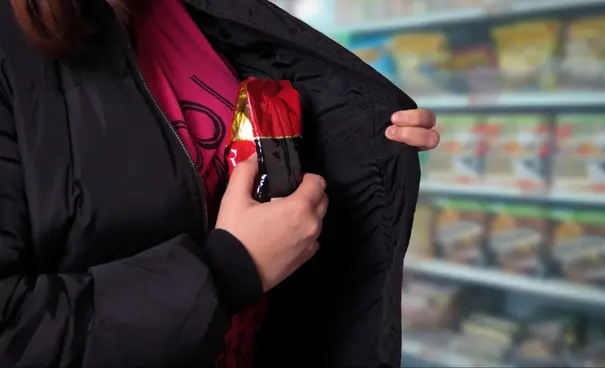Petty theft may seem insignificant, but its impact is substantial. It’s the kind of everyday crime people barely notice. Slipping a snack into a pocket, switching a price tag, or walking off with something left behind. The law, however, takes it seriously. Even if the dollar amount is low, petty theft can lead to charges, penalties, and a mark on your record.
This blog explains what petty theft entails, its significance, the associated penalties, and how businesses can safeguard themselves. And because prevention is always better than punishment, we’ll also explore how tools like remote video monitoring help stop petty theft before it becomes a bigger problem.
What is petty theft?

Petty theft, by definition, is the unlawful taking of someone else’s property when its value falls below a set legal threshold.
It could be something so small that you might not even consider it a harm, and yet you decide to pick it up. Shoplifting a low-cost item, walking off with office supplies, or swiping something left unattended in a public place are all examples of petty theft.
The term “petty” comes from the French petit, meaning “small,” but in this context, it’s not about being trivial or unimportant; it’s about the dollar value of what’s stolen compared to grand theft.
Each state or country sets its own limit. In one state, a $300 item may be considered petty theft. In another, the line might be $1,000.
The rules are consistent. The act happens without permission. The intent is to permanently deprive the owner of their property. And the value falls below the legal threshold.
Examples of petty theft:

Here are some common examples of petty theft:
- Customers swap barcodes on expensive items.
- Someone eats snacks in-store and tosses the wrapper.
- Shoplifters slip minor cosmetics into pockets or bags.
- Returning stolen clothes with fake receipts.
- Cashier “sweethearts” by giving free drinks or upsizing meals for friends.
- Bottle caps are opened, and sips are taken in the aisles.
It might be a low-value crime, or it’s just a minor workplace theft. But the consequences are enormous!
How petty theft is classified by law:
It’s usually classified as a misdemeanor, but penalties can still include fines, probation, or even short jail time depending on the circumstances and prior record.
Penalties for petty theft:
The punishment for petty theft varies by jurisdiction but often includes fines, community service, probation, restitution to the victim, or up to a year in county jail. Repeat offenders may face harsher penalties, and some states permit prosecutors to increase the charge if the individual has prior convictions.
Police typically investigate petty theft when the value of the stolen property meets the legal definition; however, the level of investigation depends on the amount stolen and the available evidence. For minor shoplifting incidents, officers may rely on security footage or witness statements, while higher-value theft may trigger a more detailed investigation.
How long does petty theft stay on your record?
A petty theft conviction can remain on your record permanently unless you take steps to remove it. Some states allow expungement or record sealing after a waiting period, but until then, it can appear on background checks indefinitely. The exact timeline depends on local laws and whether it was a misdemeanor or upgraded due to prior offenses.
Why does petty theft matter for businesses?
Petty theft may seem small at the moment, but here’s how quickly it can snowball when you run the numbers.
- A $5 item stolen 5 times a day equals $25/day, which translates to $9,125/year.
- A $15 cosmetic stolen twice a day = $30/day, which means $ 11,200/year.
- “Sweethearting” at $4 per freebie, three times a day, equals $12/day, which means $4,380/year.
- Now scale that: 50 stores, each losing $10,000 per year/year = $500,000/year across the chain.
That`s how repeated small losses like these quickly become real dollars that eat into margins, pay raises, and marketing budgets.
Petty theft isn’t just an individual concern; it adds up for retailers, property managers, and construction companies alike.
How petty theft turns into shrink (the mechanics):
- Small grabs add up. Pocketed cosmetics, snacks, or accessories rarely make headlines, but repeated thefts of tens/hundreds of times can result in significant SKU losses.
- Transaction tricks hide theft. Missed scans, voids, fake returns, and “sweethearting” let employees or accomplices mask repeated small losses at the register.
- Price-tag and barcode swapping using cheap code on an expensive item makes it appear to walk through checkout like legitimate merchandise.
- Self-checkout leakage in unattended lanes increases the opportunity for petty theft unless analytics and camera triggers are added.
- Organized reuse ORC groups can harvest petty theft; a minor theft becomes inventory for resale networks. That’s how a handful of $10 steals becomes a resale pallet.
Preventing petty theft with Remote Video Monitoring:

Most businesses deal with theft the wrong way; they wait until it happens, then deal with the penalties, the reports, and the write-offs. That’s playing defense. The more brilliant move is proactive prevention. Remote Video Monitoring flips the script from reacting to proactively stopping theft in real time.
Here’s how it works:
- AI-powered cameras scan for unusual behavior, missed scans, loitering, and barcode swaps, things that humans often overlook.
- Live monitoring agents step in immediately, using voice-down warnings or dispatching security when they see a threat.
- The result? Fewer thefts, faster response times, and less loss bleeding from your bottom line.
This isn’t just theory. Retailers use it to catch shoplifters before they leave the store. Apartment complexes use it to stop package theft in lobbies. Construction sites use it to keep thousands of dollars in tools and materials from disappearing overnight.
Remote video monitoring turns petty theft from a “cost of doing business” into a problem you can actually control.
Frequently asked questions:
What is the meaning of petty theft?
Petty theft is the act of stealing low-value items, usually under a set dollar threshold defined by law. It’s considered a minor theft compared to grand or felony theft.
What counts as petty theft?
Petty theft includes shoplifting small items, pocketing goods, or under-ringing at checkout. It generally applies when the stolen property is worth less than the state’s legal limit.
What is a petty theft charge?
A petty theft charge means prosecutors believe they can prove that you took property without permission, with the intent to keep it, and that the property’s value was under the legal cutoff. It may sound “minor,” but the charge can still affect employment, housing applications, and your criminal record.
What is the lowest charge of theft?
The lowest charge of theft is petty theft or theft in the third degree, depending on state law. It typically involves fines, probation, or community service rather than incarceration in jail.
What does “petty” mean in crime?
In crime, “petty” means minor or small-scale offenses. Petty theft involves stealing items of low value, distinguishing it from more serious theft charges.
Does petty theft go on your record?
Yes. A petty theft conviction typically goes on your permanent criminal record. That means it may show up on background checks for jobs, housing, or licenses. In some cases, you may be able to have it expunged after completing your sentence, but laws vary by state.
Conclusion:
Petty theft may seem insignificant, but for businesses, the losses quickly add up. A snack taken here or a barcode switched there, repeated hundreds of times across multiple locations, becomes a serious drain on revenue. Beyond the number, it creates operational stress, frustrates staff, and weakens customer trust.
That is why prevention matters more than punishment. While the law can penalize offenders, businesses cannot afford to wait for courts to act. Remote video monitoring provides a proactive layer of protection. AI-powered cameras catch suspicious behavior as it happens, and live agents intervene before the loss occurs. This turns theft from a hidden cost into a controllable risk.The bottom line is clear.
Petty theft is not petty when it affects your margins, your people, and your growth. Contact us today to schedule a complimentary demo on how to safeguard the future of your business.





